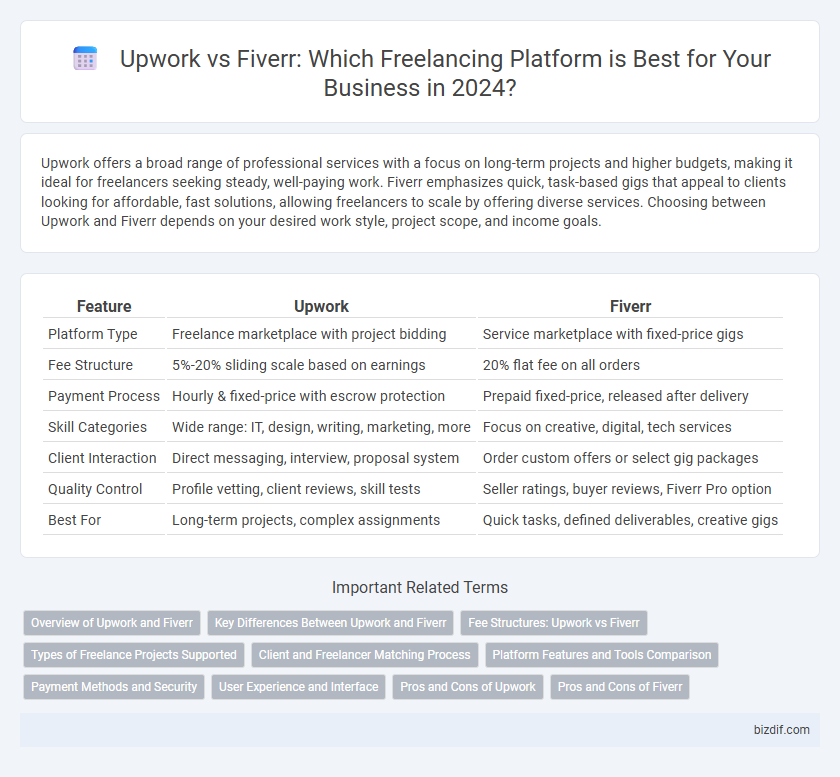Upwork offers a broad range of professional services with a focus on long-term projects and higher budgets, making it ideal for freelancers seeking steady, well-paying work. Fiverr emphasizes quick, task-based gigs that appeal to clients looking for affordable, fast solutions, allowing freelancers to scale by offering diverse services. Choosing between Upwork and Fiverr depends on your desired work style, project scope, and income goals.
Table of Comparison
| Feature | Upwork | Fiverr |
|---|---|---|
| Platform Type | Freelance marketplace with project bidding | Service marketplace with fixed-price gigs |
| Fee Structure | 5%-20% sliding scale based on earnings | 20% flat fee on all orders |
| Payment Process | Hourly & fixed-price with escrow protection | Prepaid fixed-price, released after delivery |
| Skill Categories | Wide range: IT, design, writing, marketing, more | Focus on creative, digital, tech services |
| Client Interaction | Direct messaging, interview, proposal system | Order custom offers or select gig packages |
| Quality Control | Profile vetting, client reviews, skill tests | Seller ratings, buyer reviews, Fiverr Pro option |
| Best For | Long-term projects, complex assignments | Quick tasks, defined deliverables, creative gigs |
Overview of Upwork and Fiverr
Upwork is a leading freelancing platform known for connecting skilled professionals with clients through detailed project proposals and long-term contracts, emphasizing quality and client collaboration. Fiverr operates as a marketplace where freelancers offer predefined services called "gigs" at various price points, promoting quick transactions and flexible service options. Both platforms cater to diverse industries but differ in project scope, payment models, and user experience.
Key Differences Between Upwork and Fiverr
Upwork offers a robust platform for long-term projects with hourly or fixed-price contracts, making it ideal for ongoing freelance relationships. Fiverr emphasizes quick, one-off services with clearly defined gigs and upfront pricing, catering to clients seeking fast turnaround times. While Upwork provides extensive vetting and skill tests for freelancers, Fiverr uses a tiered seller system to rate service quality and reliability.
Fee Structures: Upwork vs Fiverr
Upwork charges freelancers a sliding service fee ranging from 5% to 20% based on lifetime billings with a client, starting at 20% for the first $500 invoiced, then 10% up to $10,000, and 5% beyond that. Fiverr applies a flat 20% commission fee on all freelancer earnings per transaction regardless of project size or repeat clients. Understanding these fee structures is crucial for freelancers to optimize net income when choosing between Upwork's tiered system and Fiverr's consistent percentage model.
Types of Freelance Projects Supported
Upwork supports a wide range of freelance projects including web development, graphic design, writing, marketing, and administrative support, catering to complex, long-term assignments. Fiverr specializes in more niche, quick-turnaround gigs such as logo creation, voiceovers, video editing, and small digital tasks, often suited for one-off or shorter projects. Both platforms offer extensive categories, but Upwork emphasizes versatility for larger projects while Fiverr thrives on specialized, task-oriented services.
Client and Freelancer Matching Process
Upwork utilizes a detailed algorithm that matches clients with freelancers based on skills, project requirements, and freelancer performance history, promoting long-term collaboration and project complexity. Fiverr operates on a gig-based model where freelancers create service listings and clients select directly, fostering quick transactions and straightforward task fulfillment. Both platforms invest in client-freelancer matching but differ in approach: Upwork emphasizes personalized matching for tailored projects, while Fiverr prioritizes accessibility and speed through predefined services.
Platform Features and Tools Comparison
Upwork offers advanced project management tools including time tracking, detailed reporting, and a more robust vetting process for freelancers, which suits long-term and complex projects. Fiverr emphasizes streamlined gig creation with customizable packages, a built-in messaging system, and an easy-to-navigate interface ideal for quick tasks and microservices. Both platforms provide secure payment options, but Upwork supports hourly contracts while Fiverr focuses on fixed-price gigs, influencing client and freelancer preferences based on project size and scope.
Payment Methods and Security
Upwork offers multiple secure payment methods including direct bank transfer, PayPal, and Payoneer, with robust escrow services ensuring funds are safely held until project milestones are met. Fiverr utilizes a streamlined payment system primarily through PayPal, credit cards, and Fiverr Revenue Card, guaranteeing prompt payments once an order is marked complete. Both platforms incorporate advanced security features such as two-factor authentication and encrypted transactions to protect freelancers' financial data and minimize fraud risks.
User Experience and Interface
Upwork offers a robust user experience with a detailed dashboard and advanced filtering tools, making project management and proposal tracking intuitive for freelancers. Fiverr's interface emphasizes simplicity and visual appeal, allowing users to quickly browse gigs with clear categories and straightforward purchasing steps. Both platforms prioritize ease of navigation, but Upwork caters more to long-term project engagement while Fiverr excels in quick service transactions.
Pros and Cons of Upwork
Upwork offers a wide range of project categories and attracts high-quality clients, which provides freelancers with diverse opportunities and potentially higher earnings. Its robust dispute resolution system and detailed profiles enhance trust, but the platform's service fees, ranging from 5% to 20% based on earnings with a client, can significantly impact freelancers' net income. However, Upwork's rigorous vetting process and competitive bidding environment may pose challenges for newcomers trying to secure their first contracts.
Pros and Cons of Fiverr
Fiverr offers freelancers a user-friendly platform with a straightforward gig-based system, making it easy to showcase specific services and attract clients quickly. Its low entry barriers and flexible pricing allow beginners to establish a portfolio, but the platform charges a 20% commission on earnings, which can reduce overall profits. However, Fiverr's high competition in popular categories often requires freelancers to continuously update and differentiate their offerings to maintain visibility and secure consistent work.
Upwork vs Fiverr Infographic

 bizdif.com
bizdif.com